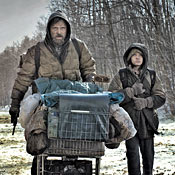- REVIEW
- READER REVIEWS
The Road
|
(No longer in theaters)
|
|
Genre
Drama, Suspense/Thriller
Producer
Paula Mae Schwartz, Steve Schwartz, Nick Wechsler
Distributor
The Weinstein Co./Dimension
Release Date
Nov 25, 2009
Release Notes
Limited
Official Website
Review
Doomsday sagas have never been far from our collective American imagination, but they’ve rarely been closer. The end-of-the-world cult of 2012 (Mayan calendar, solar neutrinos, bad vibes from the planet �Nibiru,� etc.) will only fatten its membership in the wake of the idiotic movie of the same name. Throw in (likely) environmental catastrophe, worldwide economic collapse, peak oil, Al Qaeda with Pakistani nukes, Obama the Antichrist, a zombie-cannibal plague, and apocalypse is in the air, la-la. Now comes the starkest doomsday movie yet, The Road, from a novel by Cormac McCarthy, our priest of high-toned despair. McCarthy will never get over the end of the Age of Good Men (which never existed, but don’t tell him that). He has staked his career on the idea that we’re entering a time of humanity in extremis, one in which chaos is ascendant and cannibalism, literal and metaphorical, is the rule, not the exception. The road of The Road is paved with literal cannibals. But it’s also a metaphor for the blind imperative of a father, �The Man� (Viggo Mortensen), to keep his son, �The Boy� (Kodi Smit-McPhee), both eating and uneaten.
What brought about the blinding flash that ends civilization? McCarthy isn’t telling, and neither are director John Hillcoat and screenwriter Joe Penhall. Project on this disaster what you will. (See the list above.) The dying world through which father and son trudge is monochromatic�faded browns, grays from sooty to milky, an occasional splash of dark blood. Green is history. Bare trees tumble. Fires spring up. Human bones dot the landscape. There was once a mother, �The Woman� (Charlize Theron), whom we see in The Man’s dreams, but her maternal instincts fell (strangely) by the wayside. Only The Man persists. �The child is my warrant,� he narrates. �If he is not the word of God, then God never spoke.� It might have been Darwin who spoke�but let’s not go there.
On its own grueling terms, The Road works. It brings you down, down, down, and its characters’ famishment is contagious: Your heart leaps at the sight of a can of peaches. Mortensen, bearded, smudged, greasy-haired, has a primal, haggard beauty. He lectures his son on the need for �the fire inside,� and that’s what we see in his unblinking eyes as his body wastes away. He clutches a gun with two bullets and teaches The Boy to put the barrel in one’s mouth and pull the trigger�the thinking being that a quick death is better than slow starvation or being eaten. But that’s a last resort. Mostly he uses that gun to threaten and/or blow away anything that imperils his son. What’s odd is that although The Boy never knew the brotherhood-of-man era, he pleads�in a voice that hasn’t broken�to share their food and trembles with grief when his single-minded father remains unswayed by his humanism. Yet the father doesn’t mock his son: Part of him must want to keep The Boy a boy. �Are we the good guys?� his son asks again and again, as if chanting in prayer. �Yes,� says The Man.
The movie has a dogged integrity. An inept thief (Michael Kenneth Williams, the magnetic Omar from The Wire) seems too pathetic for The Man to punish but is cruelly punished anyway. When Robert Duvall totters on as �The Old Man� (a guest-star survivor, akin to the guest-star hillbillies in Cold Mountain), we think they might adopt him as a surrogate Gramps. But The Man sees him only as a drain on their food, and The Old Man gets the drift without being told. What a tough, smart actor Duvall is. The Old Man seems enfeebled, perhaps senile�until Duvall gives you glimmers of his caginess. Affecting frailty is a survival mechanism, too.
Evocative as it is, The Road comes up short, not because it’s bleak but because it’s monotonous, and because McCarthy’s vision is finally as inflexible as his patriarchal hero’s. (Having Mom lurch off is quite an evolutionary statement.) That said, the author-hero of 2012 (John Cusack), who wrote a book in which humans cling to their goodness on the brink of extinction, seems boobishly naïve. The truth is likely somewhere in the middle. But unlike these overeager doomsday fanatics, I hope never to find out.
Related Stories
New York Magazine Reviews
- David Edelstein's Full Review (11/23/09)
